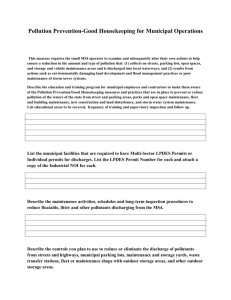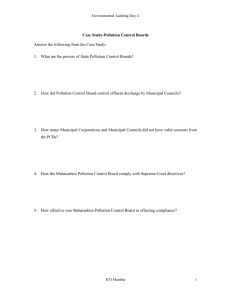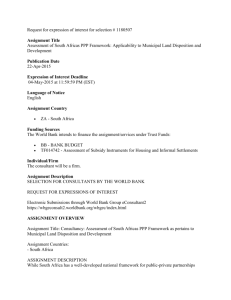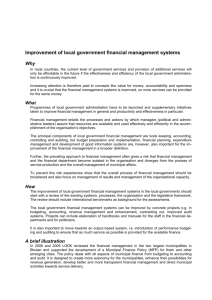The failure to implement and enforce environmental health law: The
advertisement
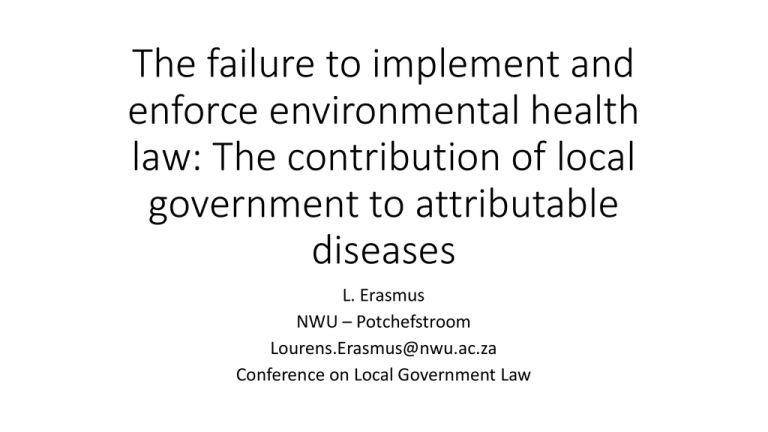
The failure to implement and enforce environmental health law: The contribution of local government to attributable diseases L. Erasmus NWU – Potchefstroom Lourens.Erasmus@nwu.ac.za Conference on Local Government Law Introduction • Leading cause of death in children – infectious intestinal disease (water pollution) • WHO – 7 million people worldwide died from air pollution • Water pollution + air pollution = environmental factors • 28% of all deaths, that is children and adults, are attributable to avoidable environmental risk factors • Environmental factors poses serious health concerns Environmental health • Encompasses those aspects of human health, including quality of life that is determined by physical, chemical, biological, social and psychosocial factors in the environment. It also refers to the theory and practice of assessing, correcting, controlling and preventing those factors in the environment that can potentially affect, adversely, the health of present and future generations (National Environmental Health Policy 2013) • Health – a state of complete physical, mental and social well-being, not merely the absence of disease (WHO, NEHP) Legal Mandate • Constitution • Structures Act • National Health Act • National Environmental Health Policy • Draft National Norms and Standards relating to Environmental Health • Health Professions Act – Regulations defining the scope of the profession of environmental health Constitution • Everyone has a right to an environment that is not harmful to their health or well-being (section 24) • The state (including local government) must respect, protect, promote and fulfil the rights in the Bill of Rights (section 7(2)) • Objectives of local government - promote a safe and healthy environment (section 152) • Executive authority, and has the right to administer municipal health services (section 156, Part B of Schedule 4) Municipal health services • Defined as a set of environmental health services (section 1 National Health Act) • • • • • • • • • water quality monitoring food control waste management health surveillance of premises surveillance and prevention of communicable diseases vector control environmental pollution control disposal of the dead chemical safety Local Government: Municipal Structures Act • Division of functions and powers (section 84) • Municipal Heath services – function of district municipalities • District municipalities – section 78 (Municipal Systems Act) investigation to determine capacity to render service • Local municipality may be authorised to render municipal health services, through a service level agreement (section 84(3)) National Health Act • Every metro and district municipality must ensure that appropriate municipal health services are effectively and equitably provided in their respective areas (section 23(1)) National Environmental Health Policy • To provide a framework for the effective implementation of environmental health services • MOH - we as a country "cannot be successful in achieving a long and healthy life for all South Africans, unless environmental health services receive the attention it deserves". • Municipal Health Plans must form part of the Municipal Integrated Development Plans • Municipalities should compile an Annual Environmental Health Status Report • National Norms and Standards Relating to Environmental Health Other laws • • • • • • • • • • • • • National Environmental Management Act NEM: Air Quality Act NEM: Waste Act National Water Act Water Services Act Foodstuffs, Cosmetics and Disinfectants Act Fertilizers, Farm Feeds, Agricultural remedies and Stock Remedies Act Cemeteries and Crematoria Act Hazardous Substances Act Tobacco Products Control Act Nuclear Energy Act Occupational Health and Safety Act National Road Traffic Act Environmental Health Practitioners • Municipal health services are rendered by EHP’s. • Appointed by mayor - metro and district municipalities. • Have to be registered before they may practice as health officers (section 2 Health Professions Act) • Regulations defining the scope of the profession • identifies specific acts that have to be performed • Vague, conflicting… although still rather comprehensive • Power of peace officer (sections 80, 83 National Health Act) • Investigate section 24 Constitution matters, and conditions that constitute, or, is likely to constitute situations which endangers the health or well-being of individuals or communities • Power of arrest, issue of notice to appear in court, etc. (section 40, 56 Criminal Procedure Act) Draft Norms and Standards relating to Environmental Health • Benchmark of quality against which delivery of environmental health services can be monitored • Norm = a desired status • Standard = mandatory legal requirement • Non-compliance with standard, exercise power as peace officer (possibly eliminating need for by-laws) • NEHP – “although the policy emphasizes the need for environmental strategies to strike an appropriate balance between promotion, education and law enforcement, where voluntary compliance is unattainable, enforcement and prosecution should be a viable option for securing environmental health improvements” Environmental Health Diseases • Impossible to list all diseases • Water pollution - cause cholera, typhoid fever, etc… • Air pollution – cause bronchitis, pneumonia, asthma and emphysema, etc… TB, Silicosis • Disease from vectors – Malaria… • Food poisoning • Pesticides exposure • Lead, mercury • Dumping sites, medical waste - several possible diseases Consequences • Primary health care – delivered through a decentralised district health system (local government responsibility) (section 30, 31 National Health Act) • Failure to implement environmental health services, end up becoming the very same municipalities problem, ie health care.. • Environmental health focus on prevention, rather than cure… cheaper and more effective in the long run. Criminal liability • Hinder EHP from performing duty (misuse/abuse) = offence (section 89(1)(a) National Health Act) • Offences – Air Quality Act, Waste Act, etc… • Section 28 NEMA, section 19 NWA - “Every person who causes, has caused or may cause significant pollution or degradation of the environment must take reasonable measures to prevent such pollution or degradation from occurring, continuing or recurring, or, in so far as such harm to the environment is authorised by law or cannot reasonably be avoided or stopped, to minimise and rectify such pollution or degradation of the environment.” Conclusion • Why implement and enforce environmental health law – the environment can be deadly! • Thank you..
